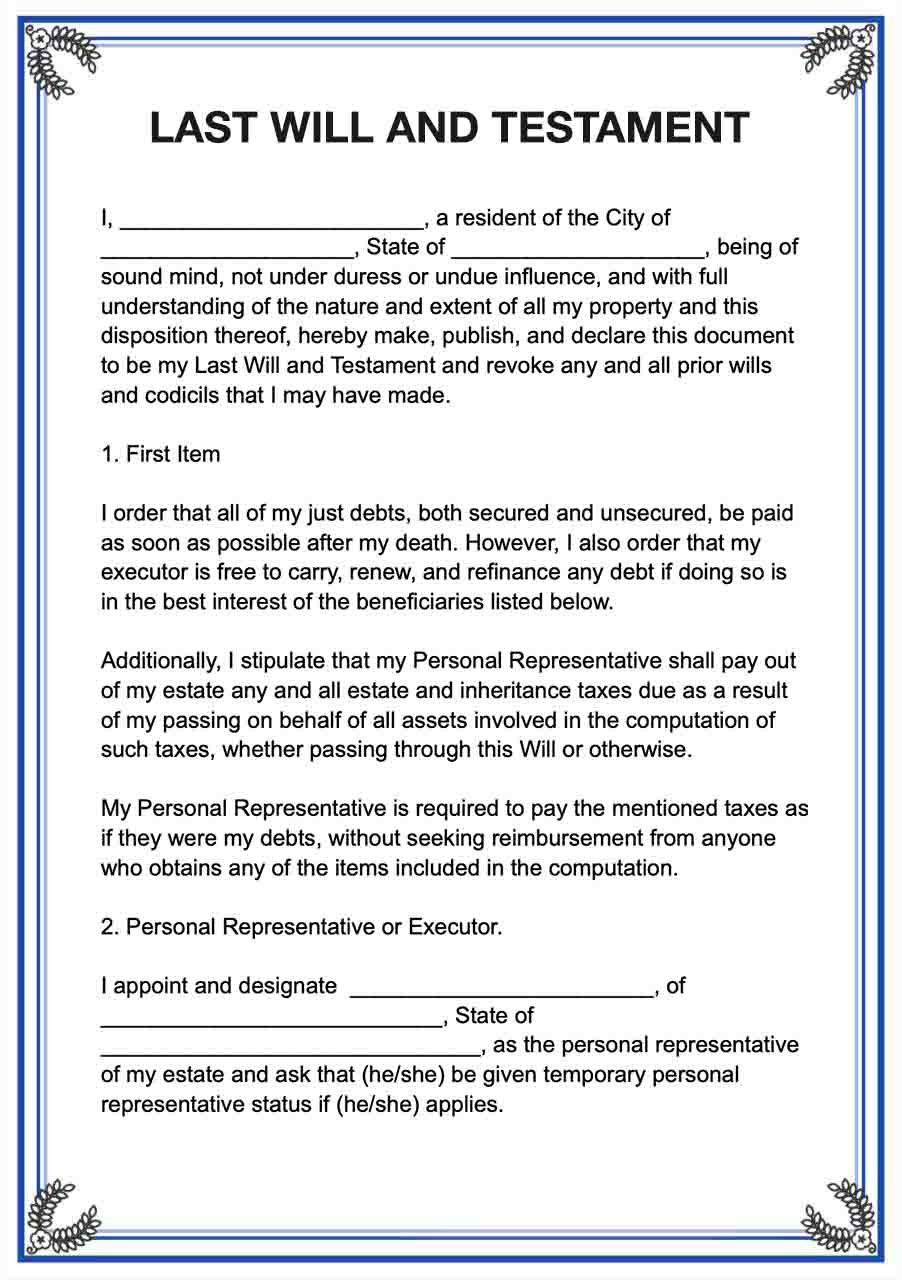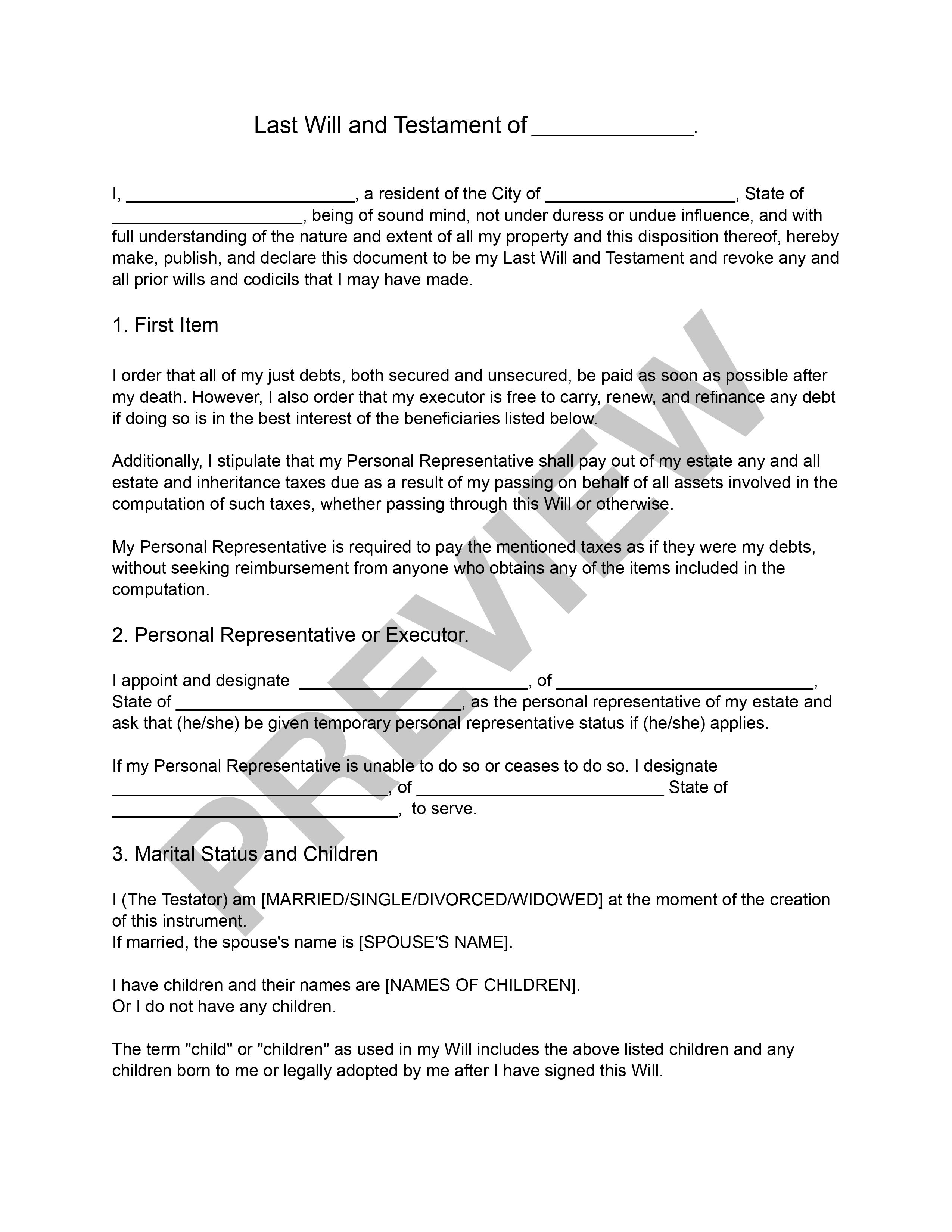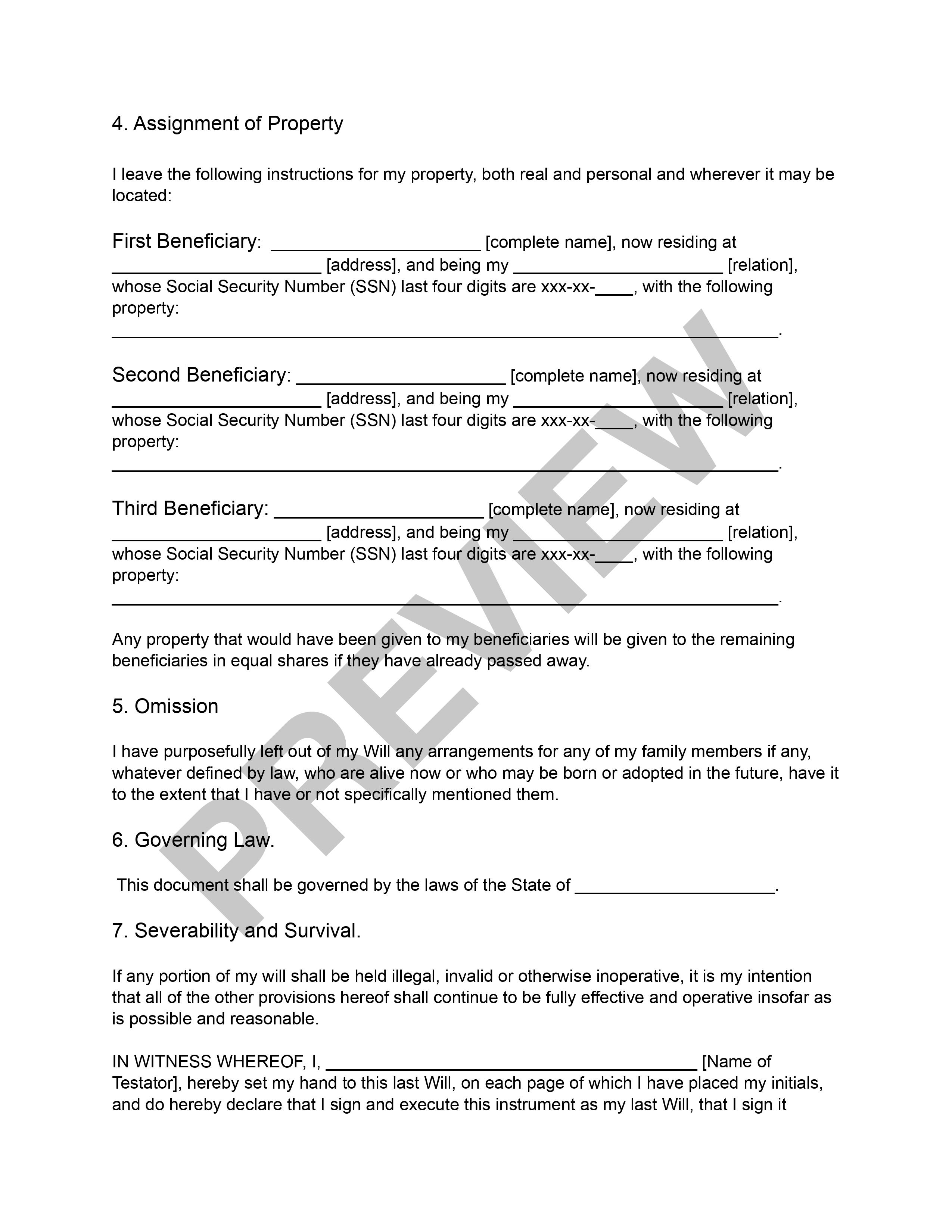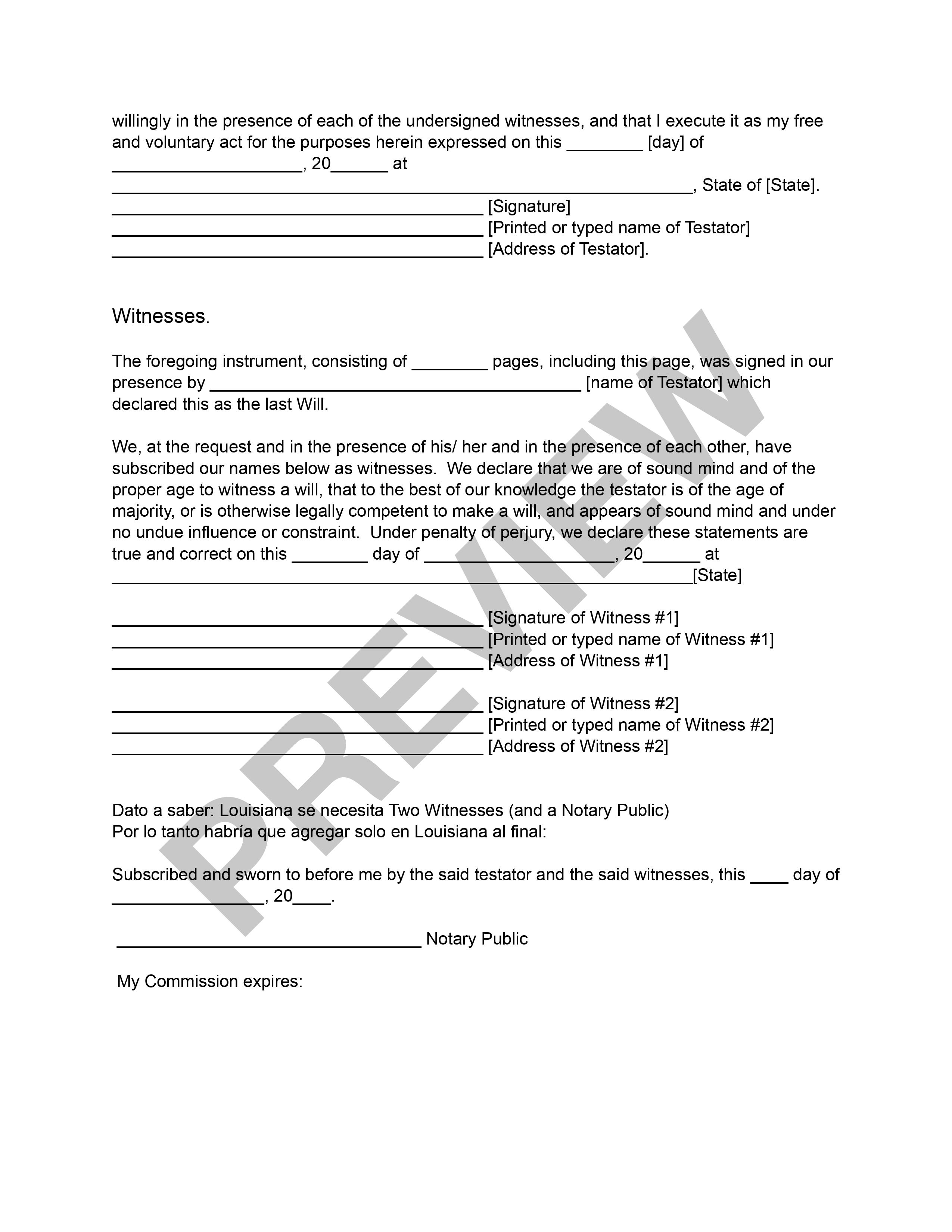Last Updated February 2023
What is a Last Will and Testament?
A last will and testament is a legal document that outlines a person's wishes regarding the distribution of their assets and property after they die. The document allows individuals to specify who should inherit their assets, including personal property, real estate, and financial accounts, as well as who should be responsible for administering their estate. A last will and testament can also name guardians for minor children and specify other important details, such as funeral arrangements.
To be considered legally binding, a last will and testament typically must be signed by the person creating the will (the "testator"), and witnessed by at least two people who are not named as beneficiaries in the will. In some jurisdictions, the will must also be notarized. It is important to note that laws governing wills can vary by jurisdiction, so it is a good idea to consult with an attorney who specializes in estate planning to ensure that your last will and testament is valid and enforceable in your area.
Who needs a Last Will and Testament?
Anyone who wants to have a say in how their assets and property are distributed after they die should consider creating a last will and testament. This includes individuals with significant assets, as well as those with more modest estates.
Having a last will and testament in place can be particularly important for those who:
-
Have minor children: A last will and testament can name a guardian for any minor children in the event that both parents die.
-
Own real estate or other significant assets: A last will and testament can specify who should inherit any real estate, financial accounts, personal property, or other significant assets, and can help ensure that those assets are distributed according to the individual's wishes.
-
Want to avoid intestacy laws: In the absence of a last will and testament, state laws will dictate how a person's assets are distributed. Creating a last will and testament can help individuals avoid the potentially unintended consequences of these laws.
-
Want to minimize conflict: A clear and unambiguous last will and testament can help minimize the potential for conflict among family members and other beneficiaries.
-
Want to support a charitable cause: A last will and testament can include provisions for charitable giving, allowing individuals to support causes that are important to them after they die.
It's important to note that laws governing wills can vary by jurisdiction, so it is a good idea to consult with an attorney who specializes in estate planning to determine if a last will and testament is right for you and to ensure that your will is valid and enforceable in your area.
What should I include in my Last Will and Testament?
A last will and testament can be a complex legal document, and the specific provisions you include will depend on your individual circumstances and wishes. However, here are some common items that many people include in their last will and testament:
-
Testator: The testator in a Last Will and Testament is the person who creates and signs the will.
-
Executor: You should name an executor who will be responsible for managing your estate after you die. This person will be responsible for paying off any debts or taxes owed, distributing assets to beneficiaries, and ensuring that your wishes are carried out.
-
Beneficiaries: You'll need to specify who you want to inherit your assets and property, and in what proportion.
-
Guardianship: If you have minor children, you'll want to name a guardian who will be responsible for their care in the event of your death.
-
Funeral arrangements: You can specify your funeral or memorial wishes, including burial or cremation preferences.
-
Digital assets: You may want to include provisions for how your digital assets, such as social media accounts, will be managed after your death.
-
Charitable giving: If you wish to leave assets to a charitable organization, you can include provisions for this in your last will and testament.
-
Alternate provisions: You may want to include alternate provisions in case a named beneficiary predeceases you, such as naming alternate beneficiaries.
It's important to note that laws governing wills can vary by jurisdiction, so it's a good idea to consult with an attorney who specializes in estate planning to ensure that your last will and testament is valid and enforceable in your area.
What can make my Last Will and Testament invalid?
There are several reasons why a Last Will and Testament may be considered invalid. Some common reasons include:
-
Lack of capacity: The person making the will (known as the testator) must be of sound mind and have the mental capacity to understand the nature and extent of their property and the effects of making a will. If a person lacks the necessary mental capacity at the time they make their will, the will may be invalid.
-
Undue influence: If someone exerts undue influence over the testator, such as through coercion or manipulation, to the extent that the testator is not making their own free decisions, then the will may be invalid.
-
Fraud or forgery: If a will is created through fraud or forgery, it may be invalid. For example, if someone forges the testator's signature or makes changes to the will without the testator's knowledge or consent, the will may not be valid.
-
Improper execution: To be valid, a will must be executed (signed and witnessed) in accordance with the legal requirements of the jurisdiction where it is made. If the will is not executed properly, it may be invalid.
-
Revocation: A will can be revoked in a number of ways, such as by creating a new will or by physically destroying the existing will. If a will has been properly revoked, it will no longer be valid.
-
Ambiguity: A will must be clear and unambiguous. If the will contains unclear or conflicting instructions, it may be difficult to determine the testator's true intentions, and the will may be challenged or deemed invalid.
It's important to consult with an attorney when creating a Last Will and Testament to ensure that it is valid and legally enforceable.
Frequently Asked Questions
The number of executors that can be appointed in a Last Will and Testament can vary depending on the laws of the jurisdiction where the will is made. In many jurisdictions, there is no limit to the number of executors that can be appointed, although it's generally recommended to keep the number of executors to a reasonable amount to avoid potential conflicts or complications in carrying out the instructions of the will.
Yes, you can choose to donate some of your wealth to charity. Making a charitable donation can be a meaningful way to give back to your community, support causes you care about, and leave a positive impact on the world.
If you are considering making a charitable donation, it's important to research and choose a reputable charity that aligns with your values and goals
If the testator has a wife, what happens to their property and assets will depend on a variety of factors, including the laws of the jurisdiction where they reside, the terms of any prenuptial or postnuptial agreements, and the specific instructions in the testator's Last Will and Testament.
In some jurisdictions, a surviving spouse may have certain legal rights to a portion of the deceased spouse's property and assets, regardless of the instructions in the will. These rights may include a right to a portion of the deceased spouse's estate, such as through an elective share or spousal allowance.
If the testator has a wife and they want to ensure that their property and assets are distributed according to their specific wishes, they may want to create a Last Will and Testament that clearly outlines their intentions. This may include instructions for how property and assets are to be divided among their spouse, children, or other beneficiaries, as well as instructions for appointing an executor to carry out the instructions in the will. It's important to consult with an attorney when creating a will to ensure that it complies with the legal requirements of the jurisdiction and meets the needs and wishes of the testator.
The number of witnesses required for a Last Will and Testament can vary depending on the laws of the jurisdiction where the will is made. In most jurisdictions, a will must be witnessed by at least two individuals who are not beneficiaries or potential beneficiaries of the will. However, some jurisdictions may require more witnesses, such as three or more.
It's important to choose witnesses who are trustworthy, of legal age, and who do not have any interest in the contents of the will. After the will has been signed, the witnesses should include their names, addresses, and signatures on the will. This will help to establish that the will was executed properly in case of any challenges to its validity in the future.
In your Last Will and Testament, you can provide instructions for how your debts should be paid after your passing. For example, you could designate specific assets or property to be sold in order to pay off outstanding debts, or you could direct that a portion of your estate be used to pay off debts before any property or assets are distributed to beneficiaries.
It's important to note that any instructions you provide in your will regarding debt repayment will be subject to the laws of the jurisdiction where you reside, as well as any other legal obligations or agreements you may have entered into. For example, if you have a mortgage on your home or a car loan, the lender may have a claim on the property that supersedes any instructions in your will.
If you have significant debts, it may be a good idea to consult with an attorney or financial advisor when creating your will to ensure that your wishes are realistic and feasible. It's also a good idea to keep your will up-to-date to reflect changes in your financial situation or obligations.



